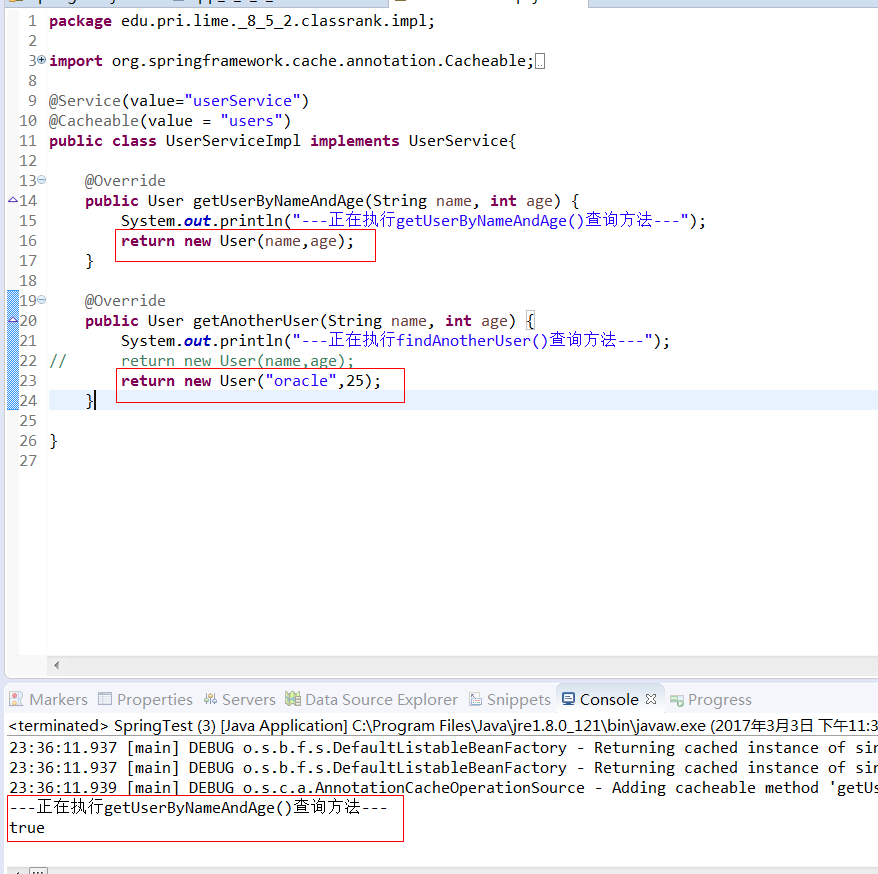8 -- 深入使用Spring -- 5...2 使用@Cacheable执行缓存
8.5.2 使用@Cacheable执行缓存
@Cacheable可用于修饰类或修饰方法,当使用@Cacheable修饰类时,用于告诉Spring在类级别上进行缓存 ------ 程序调用该类的实例的任何方法时都需要缓存,而且共享同一个缓存区;当使用@Cacheable修饰方法时,用于告诉Spring在方法级别上进行缓存 ------ 只有当程序调用该方法时才需要缓存。
1. 类级别的缓存
当使用@Cacheable修饰类时,就可控制Spring在类级别进行缓存,这样程序调用类的任意方法时,只要传入的参数相同,Spring就会使用缓存。
Component : UserServiceImpl
package edu.pri.lime._8_5_2.classrank.impl; import org.springframework.cache.annotation.Cacheable; import org.springframework.stereotype.Service; import edu.pri.lime._8_5_2.classrank.UserService; import edu.pri.lime._8_5_2.classrank.bean.User; @Service(value="userService") @Cacheable(value = "users") public class UserServiceImpl implements UserService{ @Override public User getUserByNameAndAge(String name, int age) { System.out.println("---正在执行getUserByNameAndAge()查询方法---"); return new User(name,age); } @Override public User getAnotherUser(String name, int age) { System.out.println("---正在执行findAnotherUser()查询方法---"); return new User(name,age); } }
app_8_5_2_ehcache.xml:不成功,请使用SimpleCacheManager作为缓存管理器
<?xml version="1.0" encoding="UTF-8"?> <!-- Spring 配置文件的根元素,使用Spring-beans-4.0.xsd语义约束 --> <beans xmlns:xsi="http://www.w3.org/2001/XMLSchema-instance" xmlns="http://www.springframework.org/schema/beans" xmlns:context="http://www.springframework.org/schema/context" xmlns:cache="http://www.springframework.org/schema/cache" xmlns:aop="http://www.springframework.org/schema/aop" xmlns:P="http://www.springframework.org/schema/p" xsi:schemaLocation="http://www.springframework.org/schema/beans http://www.springframework.org/schema/beans/spring-beans-4.0.xsd http://www.springframework.org/schema/aop http://www.springframework.org/schema/aop/spring-aop-4.0.xsd http://www.springframework.org/schema/cache http://www.springframework.org/schema/cache/spring-cache-4.0.xsd http://www.springframework.org/schema/context http://www.springframework.org/schema/context/spring-context-4.0.xsd"> <context:component-scan base-package="edu.pri.lime._8_5_2.classrank"> </context:component-scan> <cache:annotation-driven cache-manager="cacheManager" /> <bean id="cacheManager" class="org.springframework.cache.support.SimpleCacheManager"> <property name="caches"> <set> <bean class="org.springframework.cache.concurrent.ConcurrentMapCacheFactoryBean"> <property name="name" value="default" /> </bean> <bean class="org.springframework.cache.concurrent.ConcurrentMapCacheFactoryBean"> <property name="name" value="users" /> </bean> </set> </property> </bean> <!-- <bean id="ehCacheManager" class="org.springframework.cache.ehcache.EhCacheManagerFactoryBean"> <property name="configLocation" value="classpath:app_8_5_2_ehcache.xml"/> <property name="shared" value="false"/> </bean> <bean id="cacheManager" class="org.springframework.cache.ehcache.EhCacheCacheManager"> <property name="cacheManager" ref="ehCacheManager"/> </bean> --> </beans>
Class : SpringTest
package edu.pri.lime._8_5_2.classrank.impl; import org.springframework.context.ApplicationContext; import org.springframework.context.support.ClassPathXmlApplicationContext; import edu.pri.lime._8_5_2.classrank.UserService; import edu.pri.lime._8_5_2.classrank.bean.User; public class SpringTest { public static void main(String[] args) { ApplicationContext ctx = new ClassPathXmlApplicationContext("app_8_5_2_classrank.xml"); UserService userService = (UserService) ctx.getBean("userService"); User userA = userService.getUserByNameAndAge("lime", 24); User userB = userService.getAnotherUser("lime", 24); System.out.println(userA == userB); } }
Console :
---正在执行getUserByNameAndAge()查询方法---
true
@Cacheable(value="users")指定UserServiceImple进行类级别的缓存,这样程序调用该类的任意方法时,只要传入的参数相同,Spring就会使用缓存,即时方法的返回值并不真正的同一个对象。

此处所指的缓存的意义是:当程序第一次调用该类的实例的某个方法时,Spring缓存机制会将该方法返回的数据放入指定缓存区 ------ 就是@Cacheable注解的value属性所指定的缓存区(此处指定将数据放入users缓存区,正是缓存管理器配置的users缓存区)。以后程序调用该类的实例的任何方法时,只要出入的参数相同,Spring将不会真正执行该方法,而是直接利用缓存区中的数据。
类级别的缓存默认以所有方法参数作为key来缓存方法返回的数据 ------ 同一类不管调用哪个方法,只要调用方法时传入的参数相同,Spring都会直接利用缓存区中的数据。
使用@Cacheable时可指定如下属性:
⊙ value : 必需属性。该属性可指定多个缓存区的名字,用于指定将方法返回值放入指定的缓存区内。
⊙ key : 通过SpEL表达式显式指定缓存的key。多个参数组合的key 用#name + #age + ...
⊙ condition : 该属性指定一个返回boolean值的SpEL表达式,只有当该表达式返回true时,Spring才会缓存方法返回值。
⊙ unless : 该属性指定一个返回boolean值的SpEL表达式,当该表达式返回true时,Spring就不缓存方法返回值。
提示:
与@Cacheable注解功能类似的还有一个@CachePut注解,@CachePut注解同样会让Spring将方法返回值放入缓存区。与@Cacheable不同的是,@CachePut修饰的方法不会读取缓存区中的数据 ------ 这意味着不管缓存区是否已有数据,@CachePut总会告诉Spring要重新执行这些方法,并再次将方法返回值放入缓存区。
修改UserServiceImpl : @Cacheable(value = “users” , key = “#name”) 显式指定以name参数作为缓存的key,这样只要调用的方法具有相同的name参数,Spring缓存机制就会生效。
package edu.pri.lime._8_5_2.classrank.service.cacheablekey.main; import org.springframework.context.ApplicationContext; import org.springframework.context.support.ClassPathXmlApplicationContext; import edu.pri.lime._8_5_2.classrank.bean.User; import edu.pri.lime._8_5_2.classrank.service.cacheable.UserService; public class SpringTest { public static void main(String[] args) { ApplicationContext ctx = new ClassPathXmlApplicationContext("app_8_5_2_classrankkey.xml"); UserService userService = (UserService) ctx.getBean("userService"); User userA = userService.getUserByNameAndAge("lime", 22); User userB = userService.getAnotherUser("lime", 24); System.out.println(userA == userB); } }
Console :
---正在执行getUserByNameAndAge()查询方法---
true
使用@Cacheable注解显式指定key = “#name” ,这就意味着缓存使用name参数作为缓存的key。
condition属性与unless属性的功能基本相似,但规则恰好相反:当condition指定的条件为true时,Spring缓存机制才会执行缓存;当unless指定的条件为true时,Spring缓存机制就不执行缓存。
Class : UserServiceImpl
package edu.pri.lime._8_5_2.classrank.service.cacheablecondition.impl; import org.springframework.cache.annotation.Cacheable; import org.springframework.stereotype.Service; import edu.pri.lime._8_5_2.classrank.bean.User; import edu.pri.lime._8_5_2.classrank.service.cacheablecondition.UserService; @Service("userService") @Cacheable(value="users" ,condition="#age<100") public class UserServiceImpl implements UserService{ @Override public User getUserByNameAndAge(String name, int age) { System.out.println("---正在执行getUserByNameAndAge()查询方法---"); return new User(name,age); } @Override public User getAnotherUser(String name, int age) { System.out.println("---正在执行getAnotherUser()查询方法---"); return new User("oracle",25); } }
XML :
<?xml version="1.0" encoding="UTF-8"?> <!-- Spring 配置文件的根元素,使用Spring-beans-4.0.xsd语义约束 --> <beans xmlns:xsi="http://www.w3.org/2001/XMLSchema-instance" xmlns="http://www.springframework.org/schema/beans" xmlns:context="http://www.springframework.org/schema/context" xmlns:cache="http://www.springframework.org/schema/cache" xmlns:aop="http://www.springframework.org/schema/aop" xmlns:P="http://www.springframework.org/schema/p" xsi:schemaLocation="http://www.springframework.org/schema/beans http://www.springframework.org/schema/beans/spring-beans-4.0.xsd http://www.springframework.org/schema/aop http://www.springframework.org/schema/aop/spring-aop-4.0.xsd http://www.springframework.org/schema/cache http://www.springframework.org/schema/cache/spring-cache-4.0.xsd http://www.springframework.org/schema/context http://www.springframework.org/schema/context/spring-context-4.0.xsd"> <context:component-scan base-package="edu.pri.lime._8_5_2.classrank.service.cacheablecondition.impl"> </context:component-scan> <!-- 启用Spring缓存 --> <cache:annotation-driven cache-manager="cacheManager" /> <!-- 使用simpleCacheManager缓存管理器 --> <bean id="cacheManager" class="org.springframework.cache.support.SimpleCacheManager"> <!-- 配置缓存区 --> <property name="caches"> <set> <!-- 使用ConcurrentMapCacheFactoryBean工程Bean生产缓存区 --> <bean class="org.springframework.cache.concurrent.ConcurrentMapCacheFactoryBean"> <!-- 定义缓存区名称 --> <property name="name" value="default" /> </bean> <bean class="org.springframework.cache.concurrent.ConcurrentMapCacheFactoryBean"> <!-- 定义缓存区名称 --> <property name="name" value="users" /> </bean> </set> </property> </bean> </beans>
Console :
---正在执行getUserByNameAndAge()查询方法---
---正在执行getAnotherUser()查询方法---
false
---正在执行getUserByNameAndAge()查询方法---
---正在执行getAnotherUser()查询方法---
false
---正在执行getUserByNameAndAge()查询方法---
---正在执行getAnotherUser()查询方法---
false
疑惑 : 跟想象中的不一样啊! 说好的condition表达式呢?
使用@Cacheable修饰方法时,可控制Spring在方法级别进行缓存,这样当程序调用该方法时,只要传入的参数相同,Spring就会使用缓存。
2.方法级别的缓存
Class : UserServiceImpl
package edu.pri.lime._8_5_2.functionrank.service.impl; import org.springframework.cache.annotation.Cacheable; import org.springframework.stereotype.Service; import edu.pri.lime._8_5_2.functionrank.bean.User; import edu.pri.lime._8_5_2.functionrank.service.UserService; @Service("userService") public class UserServiceImpl implements UserService{ @Override @Cacheable(value="userA") public User getUserByNameAndAge(String name, int age) { System.out.println("---正在执行getUserByNameAndAge()查询方法---"); return new User(name,age); } @Override @Cacheable(value="userB") public User getAnotherUser(String name, int age) { System.out.println("---正在执行findAnotherUser()查询方法---"); return new User("oracle",25); } }
XML : app_8_5_2_functionrankvalue.xml
<?xml version="1.0" encoding="UTF-8"?> <!-- Spring 配置文件的根元素,使用Spring-beans-4.0.xsd语义约束 --> <beans xmlns:xsi="http://www.w3.org/2001/XMLSchema-instance" xmlns="http://www.springframework.org/schema/beans" xmlns:context="http://www.springframework.org/schema/context" xmlns:cache="http://www.springframework.org/schema/cache" xmlns:aop="http://www.springframework.org/schema/aop" xmlns:P="http://www.springframework.org/schema/p" xsi:schemaLocation="http://www.springframework.org/schema/beans http://www.springframework.org/schema/beans/spring-beans-4.0.xsd http://www.springframework.org/schema/aop http://www.springframework.org/schema/aop/spring-aop-4.0.xsd http://www.springframework.org/schema/cache http://www.springframework.org/schema/cache/spring-cache-4.0.xsd http://www.springframework.org/schema/context http://www.springframework.org/schema/context/spring-context-4.0.xsd"> <!-- 扫描Spring的组件 --> <context:component-scan base-package="edu.pri.lime._8_5_2.functionrank.service.impl"/> <!-- 启用Spring缓存 --> <cache:annotation-driven cache-manager="cacheManager" /> <!-- 使用simpleCacheManager缓存管理器 --> <bean id="cacheManager" class="org.springframework.cache.support.SimpleCacheManager"> <!-- 配置缓存区 --> <property name="caches"> <set> <!-- 使用ConcurrentMapCacheFactoryBean工程Bean生产缓存区 --> <bean class="org.springframework.cache.concurrent.ConcurrentMapCacheFactoryBean"> <!-- 定义缓存区名称 --> <property name="name" value="userA" /> </bean> <bean class="org.springframework.cache.concurrent.ConcurrentMapCacheFactoryBean"> <!-- 定义缓存区名称 --> <property name="name" value="userB" /> </bean> </set> </property> </bean> </beans>
Class : SpringTest
package edu.pri.lime._8_5_2.functionrank; import org.springframework.context.ApplicationContext; import org.springframework.context.support.ClassPathXmlApplicationContext; import edu.pri.lime._8_5_2.functionrank.bean.User; import edu.pri.lime._8_5_2.functionrank.service.UserService; public class SpringTest { public static void main(String[] args) { ApplicationContext ctx = new ClassPathXmlApplicationContext("app_8_5_2_functionrankvalue.xml"); UserService userService = ctx.getBean("userService",UserService.class); User userA = userService.getUserByNameAndAge("lime", 24); User userB = userService.getAnotherUser("lime", 24); System.out.println(userA == userB); User userC = userService.getUserByNameAndAge("lime", 24); User userD = userService.getAnotherUser("lime", 24); System.out.println(userA == userC); } }
Console :
---正在执行getUserByNameAndAge()查询方法--- ---正在执行findAnotherUser()查询方法--- false true
方法级别的缓存中,方法之间使用不同的缓存区,因此它们不能共享缓存。
啦啦啦
啦啦啦
啦啦啦
啦啦啦


